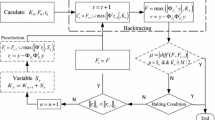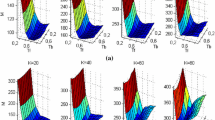Abstract
Compared with convex optimization algorithms and combination algorithms, greedy pursuit algorithms can balance operational efficiency and reconstruction precision, so they are widely used in the signal reconstruction step of compressed sensing. However, most existing greedy pursuit algorithms only work well if the signal sparsity is known, and their reconstruction performance is influenced by signal sparsity. To more accurately match the sparsity and obtain better reconstruction performance, we propose a greedy pursuit algorithm, the sparsity estimation based adaptive matching pursuit algorithm, which achieves image reconstruction using a signal sparsity estimation based on the Restricted Isometry Property (RIP) criterion and a flexible step size. Experimental results demonstrate that this algorithm provides better reconstruction performance and lower computation time, using different measurement matrices, when the sparsity is estimated in advance.







Similar content being viewed by others
References
Bin G, Sun X, Sheng VS (2016a) Structural minimax probability machine. IEEE Transactions on Neural Networks and Learning Systems. doi:10.1109/TNNLS.2016.2544779
Bin G, Victor S, Sheng A (2016b) Robust regularization path algorithm for ν-support vector classification. IEEE Transactions on Neural Networks and Learning Systems. doi:10.1109/TNNLS.2016.2527796
Blumensath T, Davies ME (2009) Stagewise Weak Gradient Pursuits. IEEE Trans Signal Process 57(11):4333–4346
Candès EJ (2006) Compressive sampling. In Proceedings of the International Congress of Mathematicians 3:1433–1452
Candes E, Romberg J (2005) l1-magic: Recovery of sparse signals via convex programming. URL:www.acm.caltech.edu/l1magic/downloads/l1magic.pdf, 4, p 14
Candes EJ, Romberg J, Tao T (2006) Robust uncertainty principles: exact signal reconstruction from highly incomplete frequency information. IEEE Trans Inf Theory 52(2):489–509
Dai W, Milenkovic O (2009) Subspace pursuit for compressive sensing signal reconstruction. IEEE Trans Inf Theory 55(5):2230–2249
Daubechies I, Defrise M, De Mol C (2004) An iterative thresholding algorithm for linear inverse problems with a sparsity constraint. Comm Pure Appl Math 57:1413–1457
Do TT, Gan L, Nguyen N et al. (2008) Sparsity adaptive matching pursuit algorithm for practical compressed sensing. 42nd Asilomar IEEE Conference on Signals, Systems and Computers, p 581–587
Donoho DL, Tsaig Y, Drori I et al. (2006) Sparse Solution of Underdetermined Linear Equations by Stagewise Orthogonal Matching Pursuit. Technique Report TR-2006-2, Standford University, Department of Statistics
Donoho DL, Elad M, Temlyakov VN (2007) On Lebesgue-typ2e inequalities for greedy approximation. Journal of Approximation Theory 147(2):185–195
Elad M, Bruckstein AM (2002) A generalized uncertainty principle and sparse representation in pairs of bases. IEEE Transactions on Information Theory, p 2558–2567
Eldar YC., Kutyniok G eds. (2012) Compressed sensing: theory and applications. Cambridge University Press
Figueiredo MAT, Nowak RD, Wright SJ (2007) Gradient projection for sparse reconstruction: application to compressed sensing and other inverse problems. IEEE J Sel Top Signa 1:586–597
Fornasier M, Rauhut H (2010) Compressive sensing. Handbook. Mathematical Methods in Imaging, vol. 1, ed. by O. Scherzer Springer, Berlin, p 187–229
Foucart S, Rauhut H (2013) Restricted Isometry Property. A Mathematical Introduction to Compressive Sensing. Springer, New York, 133–174
Gilber AC, Strauss MJ, Tropp JA et al. (2006) Algorithmic linear dimension reduction in the L1 norm for sparse vectors. Proceedings of the 44th Annual Allerton Conference on Communication, Control and Computing 1–9
Gilbert AC, Strauss MJ, Vershynin R (2007) One sketch for all: Fast algorithms for Compressed Sensing. In Proc. 39th ACM Symp. Theory of Computing (STOC), San Diego, June 2007
Hoyer PO (2004) Non-negative matrix factorization with sparseness constraints. J Mach Learn Res 5:1457–1469
Iwen MA (2010) Combinatorial sublinear-time Fourier algorithms. Found Comput Math 10(3):303–338
Jinming W, Xiao-Wen C (2017) The success probability of the Babai point estimator in box-constrained integer linear models. IEEE Trans Inf Theory 63:631–648
Mallat SG, Zhang Z (1993) Matching pursuits with time-frequency dictionaries. IEEE Trans Signal Process 41(12):3397–3415
Needell D, Tropp JA (2008) CoSaMP: iterative signal recovery from incomplete and inaccurate samples. Applied & computational Harmonic Analysis 26(12):93–100
Needell D, Vershynin R (2010) Signal recovery from incomplete and inaccurate measurements via regularized orthogonal matching pursuit [J]. IEEE Journal of Selected Topics in Signal Processing 4(2):310–316
Pan ZQ, Lei JJ, Zhang Y, Sun XM, Kwong S (2016a) Fast motion estimation based on content property for low-complexity H.265/HEVC encoder. IEEE Transactions on Broadcasting p 1–10 doi:10.1109/TBC.2016.2580920
Pan Z, Lei J, Zhang Y et al (2016b) Fast motion estimation based on content property for low-complexity H. 265/HEVC encoder[J]. IEEE Trans Broadcast 62(3):675–684
Sharon Y, Wright J, Ma Y (2007) Computation and Relaxation of Conditions for Equivalence between l1and l0 Minimization. CSL Technical Report UILU-ENG-07-2208, Univ. of Illinois, Urbana-Champaign
Tropp JA, Gilbert AC (2007) Signal recovery from random measurements via orthogonal matching pursuit[J]. IEEE Trans Inf Theory 53(12):4655–4666
Wang J, Kwon S, Shim B (2011a) Generalized orthogonal matching pursuit. IEEE Trans Signal Process 60(12):6202–6216
Wang H, Maldonado D, Silwal S (2011b) A nonparametric-test-based structural similarity measure for digital images. Comput Stat Data Anal 55(11):2925–2936
Xia Z, Wang X, Sun X et al (2014) Steganalysis of least significant bit matching using multi-order differences[J]. Security and Communication Networks 7(8):1283–1291
Yao S, Wang T, Shen W, et al. (2015) Research of incoherence rotated chaotic measurement matrix in compressed sensing. Multimedia Tools & Applications 1–19
Acknowledgements
The research work reported in this paper is supported by the National Natural Science Foundation of China (No: 41271398, 41671382, 61572372), China Postdoctoral Science Foundation (Grant No.2016 M592409), National Program on Key Basic Research Project (No: 2011CB302306). In addition, this work is partially supported by LIESMARS Special Research Funding, SAST Funding (No. SAST201425) and Open Funding of NUIST, PAPD and CICAEET.
Author information
Authors and Affiliations
Corresponding author
Rights and permissions
About this article
Cite this article
Yao, S., Wang, T., Chong, Y. et al. Sparsity estimation based adaptive matching pursuit algorithm. Multimed Tools Appl 77, 4095–4112 (2018). https://doi.org/10.1007/s11042-016-4295-0
Received:
Revised:
Accepted:
Published:
Issue Date:
DOI: https://doi.org/10.1007/s11042-016-4295-0




